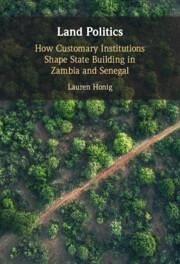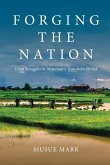"This book examines the struggle to control land in Africa through the lens of land titling in Zambia and Senegal. Contrary to standard wisdom portraying titling as an inevitable product of economic development, this book traces its distinctly political logic, showing that local actors empowered by informality act to preserve customary property rights - even when land values and demand are high. The book's analysis centers on customary institutions and their leaders, customary authorities or "chiefs," and how the strength of customary institutions and a citizen's position within them shape land tenure outcomes. Examining sub-national patterns within two very different countries, it reveals a common pattern in which variations in the ability of local institutions to retain power, not state capacity, determine state building outcomes. Based on extensive fieldwork, this book contributes new insight into our understandings of the political determinants of property rights and the persistence of institutional legacies"--
Hinweis: Dieser Artikel kann nur an eine deutsche Lieferadresse ausgeliefert werden.
Hinweis: Dieser Artikel kann nur an eine deutsche Lieferadresse ausgeliefert werden.








